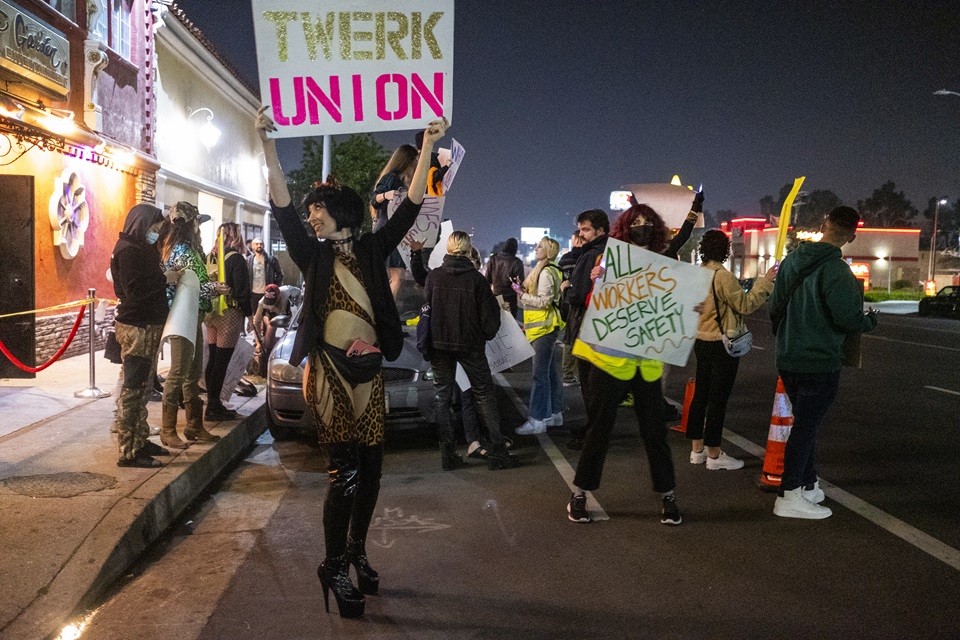
LOS ANGELES—“We create stories and characters, that is our strength. That is the essence of what we do, and it’s essential to what actors and writers do,” Charm says. “It’s important to know how we have been victimized, but it’s so important to show them that they can’t kill your spirit.”
Charm, a Hollywood-based actress and stripper, is one of the dancers who was locked out of Star Garden, a North Hollywood strip club, in early 2022. After 15 months on strike, the locked-out workers finally got a chance to vote and won their union unanimously. They are now represented by the Actors’ Equity Association.
“I don’t think employers realize that when they put people in this position, they have nothing left to lose at a certain point,” Charm tells People’s World. “When the strike was in front of me, I was like, ‘Sure, I’ll go down with the fucking ship.’”
The ship metaphor seems more timely than ever, as orcas fighting back against invasive yachts have recently become as much a symbol of resistance as strippers, actors, screenwriters, Waffle House staff, graduate students, casino workers, teachers, auto workers, and UPS employees.
Arguments describing sex work as inherently victimizing are common, but that is not what Charm is talking about here. The victimizing that Charm alludes to is not the one of sex workers as victims in particular but rather workers generally as victims of a much broader system of exploitation.
Although there is a lot of debate on the topic of exploitation and sex work, from Charm’s experience working multiple roles in the entertainment industry, she says there is a lot of overlap in how people are treated, no matter what job they occupy.
“I think a lot of us are conditioned to think, ‘Oh my god, I booked something, I’m so lucky! I have to shut my mouth and take the opportunity, and not ask for what I deserve!’” Charm explained the feeling of booking some of her first acting gigs. “The dangling carrot of just having a job—whether in stripping, acting, or writing—fosters this scarcity mentality. It’s refreshing to see people realize they deserve to be taken care of when they are working.
“That mentality is so strong, too. There is always this idea that there’s this person who will do more for less,” she added. “So, I am [made] to think that I might have to take myself down to a level of doing something less safe or for less [pay] than I deserve because there’s this opportunity in front of me, and if I don’t take it I’ll starve.”
However, for every “lucky” person who books a gig, there are many more who remain unlucky. Through this lens, the experiences of workers in the entertainment industry start to look similar to those of people working in the service industry or anyone recently laid off from a corporate job: Feeling lucky bears no witness to the sacrifices that people make to gain or retain employment.
“After years of doing that, I have this leg injury. There’s this consistent pain in my body that’s a reminder of ‘Look at what happens to you when you’re forced to do something,’” Charm laments. “It was really convenient for a lot of other people—the people who were making money off of me—that I was willing to work that way.”
There are plenty of famous stories of actors getting hurt on set, often after being forced into unsafe situations, as Quentin Tarantino did to Uma Thurman on the set of Kill Bill. More recently, Brendan Fraser, who has virtually disappeared from Hollywood, opened up about the damage done to his body from doing stunt work.
Something eerily similar occurred across several industries at the height of the pandemic. Several workers were deemed “essential,” which became the new, heroic moniker in place of the more suggestive “unskilled.” Ultimately, this new designation meant that their health and safety were to be dispensed with first. Consider how UPS workers were once considered “essential workers” who delivered much-needed cleaning supplies and masks while COVID-19 kept everyone isolated. After the pandemic receded, a raise for these same “essential” workers was out of the question in the minds of the logistics CEOs and a strike was totally unacceptable.
“They are all too happy to throw me to the wolves when I’m no longer able to go back to stripping,” Charm explained. “I’ve always known that this is not something I can do for the rest of my life, and the industry will spit me out when it’s done with me, but I deserve something sustainable. Just look at how much time and energy and love I have given to this community.”
It is not just safety that binds workers across various industries, it’s also the overlap of the work. “Entertainment,” for instance, isn’t something that can be restricted to just the jobs typically given the label. Going out to eat, taking vacations, staying in hotels, enjoying any sort of performance—these are all forms of “entertainment,” so it’s no surprise that the Equity Strippers, the union born of the North Hollywood strike, spent a lot of time last year picketing with SAG-AFTRA, WGA, UNITE HERE Local 11, and Medieval Times workers.
A collective victory
The dancers from Star Garden should have been celebrating their union victory last September, but the company challenged their votes and even took the extreme tactic of “going out of business” to avoid unionization. But instead of savoring their win, the dancers were informed that every one of them would be a witness in a trial last May.
“We had somewhat given up on achieving the union in this regimented, strategic way,” Charm said. “We were all doing witness prep with the National Labor Relations Board and simultaneously pivoting our efforts from unionizing into managing the Stripper Co-op we began.”
But then, only a few days before the trial was to begin, they got word that the management of Star Garden now wanted to come to a settlement.
“They offered to not challenge the union. We finally got to have our vote count at the NLRB. Just days before we were meant to have this long, arduous trial, we were in the same courtroom where we had our unanimous vote count,” Charm recounted. “Arriving in that place after all the swerving and reorienting we had been doing, it was surreal and in some ways kind of felt like whiplash.
“It was truly one of the most amazing, beautiful moments,” she added. And theirs had been a strike of many unique moments. News reports that aired during the strike, for instance, bore witness less to a traditional picket line and more to what looked like a different party every night.
“Our community is invaluable, and they can never take that from us,” Charm explained. “That was the rallying morale booster through our entire campaign. In some ways, we were going to win no matter what, because we are the joy of Star Garden and we took the joy with us when we were locked out.”
Pointing out the importance of joy here is, of course, no accident either. Charm’s description is one that anyone working in the entertainment or service industries knows all too well. People may be able to tune into a TV show or watch a film because of the financing provided by a studio, but the joy they feel comes from the writers and actors, and that joy stems from the love those creative professionals have for their job.
When asked if there was any advice to pass on from this experience—this victory—to those fighting the same fight, Charm offered: “Never give up your fierceness, because that is ultimately what is going to bring the employers to the table.”

The struggle after the strike
Despite having their union recognized, the strippers of Star Garden found themselves back on the picket line last month. Accusing management of unfair labor practices and union-busting, the dancers were back in front of the club with the same joy they left with in the summer.
Although many of the safety concerns have been addressed by club management, other changes have seemingly been put in place to punish the workers, leading to what they call an “unworkable” environment.
Above all, the largest problem for the striking strippers is that they are still without a contract, and this has left them vulnerable to new practices at the club.
As one dancer pointed out, instead of changing club policies to protect the strippers, there have been restrictions placed on how they are allowed to conduct themselves. “We’re now no longer allowed to be anywhere near customers,” said Lilith, one of the dancers of Star Garden.
“They have now become ‘cashless,’ interfering with our ability to earn tips,” Charm explained. “Dancers have to bring their own ones [$1 bills] in order to exchange with customers for larger bills in hopes that we will be tipped onstage, a service the club itself used to provide. If a customer takes out their phone to tip one of us electronically, they can be thrown out immediately for it.”
Some of these changes are clearly retaliatory, while others seem downright self-destructive for a business to pursue, all for the sake of avoiding a contract.
“There is hope the contract will be completed and signed, but in my opinion, significant roadblocks have been placed in the way by management for the purpose of dragging this process out,” Charm pointed out. “I do feel like management is hoping to starve us out before we can actually agree on all the points of the contract.”
Perhaps with a little more luck and a lot more struggle, the dancers of Star Garden will have a better workplace. Regardless of how that luck plays out, they have not lost their joy. To quote a recent Instagram post from Equity Strippers: “Revolution, with its potent combination of adrenaline and imagination, is a fountain of creativity.”
We hope you appreciated this article. At People’s World, we believe news and information should be free and accessible to all, but we need your help. Our journalism is free of corporate influence and paywalls because we are totally reader-supported. Only you, our readers and supporters, make this possible. If you enjoy reading People’s World and the stories we bring you, please support our work by donating or becoming a monthly sustainer today. Thank you!












Comments